Xiangqi (Chinese Chess) promoter Wang Ge in Europe: An Interview
Author: Jim Png from xqinenglish.com
Note: This article first appeared on Xiangqi.com
One man has been promoting Xiangqi (Chinese Chess) in Europe for the past decade. His efforts have been instrumental in making the game known to the West and have set up a bridge for the transfer of information from Chinese to English and German. The author is privileged to introduce Mr. Wang Ge (王各 wáng gè) who now works as a Chinese Chess/International Chess/Shogi coach in Stuttgart, Germany.
The author became first acquainted with Mr. Wang back in the mid-2010s where Mr. Wang wrote to the author about some of the articles on his website. Over time, the author found that he had many similarities and ideas on the promotion of Xiangqi with Mr. Wang, and he is proud to say that they have met several times since then and are very comrades in the promotion of Xiangqi. It is with great honor that the author presents to the reader a short interview with Wang Ge!
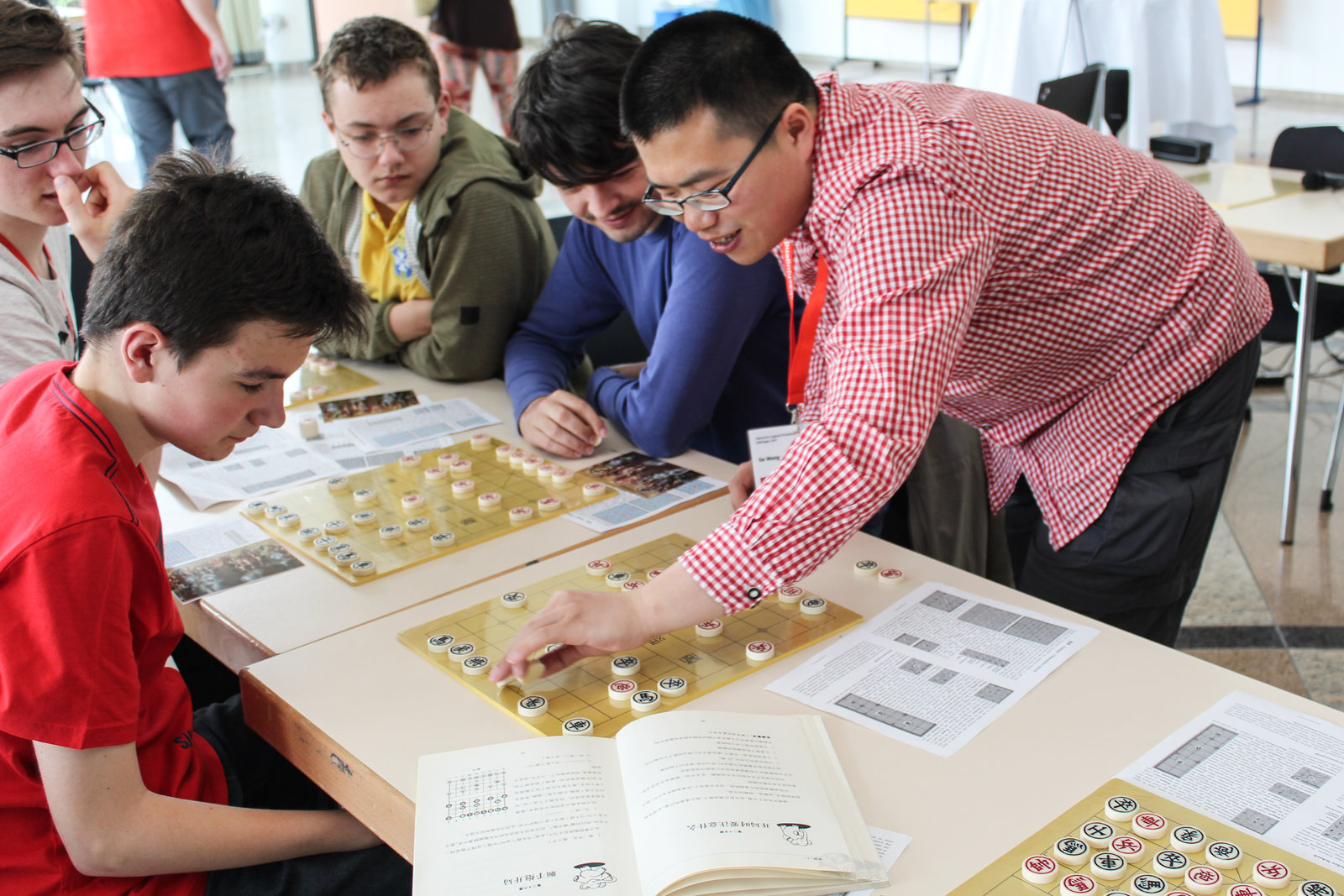
Diagram 1 Wang Ge doing what he loves most!
The author presents the interview in the following sections:
- Wang Ge’s credentials
- Short introduction
- Personal best and Coaching credentials
- Arbiting Credentials
- Xiangqi related titles
- Xiangqi Academic Achievements
- Interview with Wang Ge
- Afterthoughts
Wang Ge’s credentials
Mr. Wang’s credentials are very impressive indeed.
Short introduction
Wang Ge was born on the 3rd of July in 1987 in Shanghai. He graduated with a degree in Biological Engineering from the East China University of Science and Technology. He continued to pursue his Master’s Degree in Environmental Protection in 2011 from the University of Nürtingen-Geislingen.
Upon obtaining his Master’s Degree, he decided to pursue a career that would allow him to reacquaint his love for different forms of Chess (generic term). Xiangqi is one of the loves of his life. From 2011 to 2020, Wang Ge worked hard by organizing Xiangqi classes in over twenty kindergartens, elementary schools, and junior high schools in Stuttgart, where he stays. To date, he has introduced and taught the game of Xiangqi to well over a thousand pupils for his career.
Feeling that he could do more, he has organized Xiangqi lectures to introduce the game to the general public in German. His lessons and Xiangqi programs are common events in various German museums, libraries, the Confucian Institute, local clubs, and Sino German Culture Exchange centers. When the author asked Wang how many such activities had he organized, he sheepishly answered that he had lost count but felt that the number was about one hundred or so.
Personal best and Coaching credentials
Wang Ge was placed third in the Stuttgart Xiangqi Tournament.
For Shogi, he won the newcomer award in the annual Shogi tournament held at Ludwigshafen. Wang was placed in third place in the 2012 Colmar Tournament in France.
Wang is a certified coach of the Chinese Xiangqi Federation with an Elo rating of 1552. He is also a Class C coach for International Chess (DWZ 1600). In the past few years, Mr. Wang improved his credentials where he also became a Shogi coach with a European Elo rating of 1528 and is a certified 2nd Kyu.
His students have also performed very well under his tutelage. From 2014 to 2018, Wang Ge’s students have either won or were placed in the top three positions in the Under 10 Division of Shogi Tournaments in Germany.
But that is not all! One of Mr. Wang Ge’s students was placed 9th in the World Xiangqi Federation Under 10 division!
Arbiting Credentials
From 2014 to 2019, Wang Ge has either served as one of the committee members or the tournament director in various tournaments that included the Xiangqi World Cup, the Han Xin Cup, the European Xiangqi Cup, the German Xiangqi Tournament et cetera. He also has extensive experience in pairing and arbiting work.
Indeed, the translated German edition of the Asian Xiangqi Federation Rules is his work.
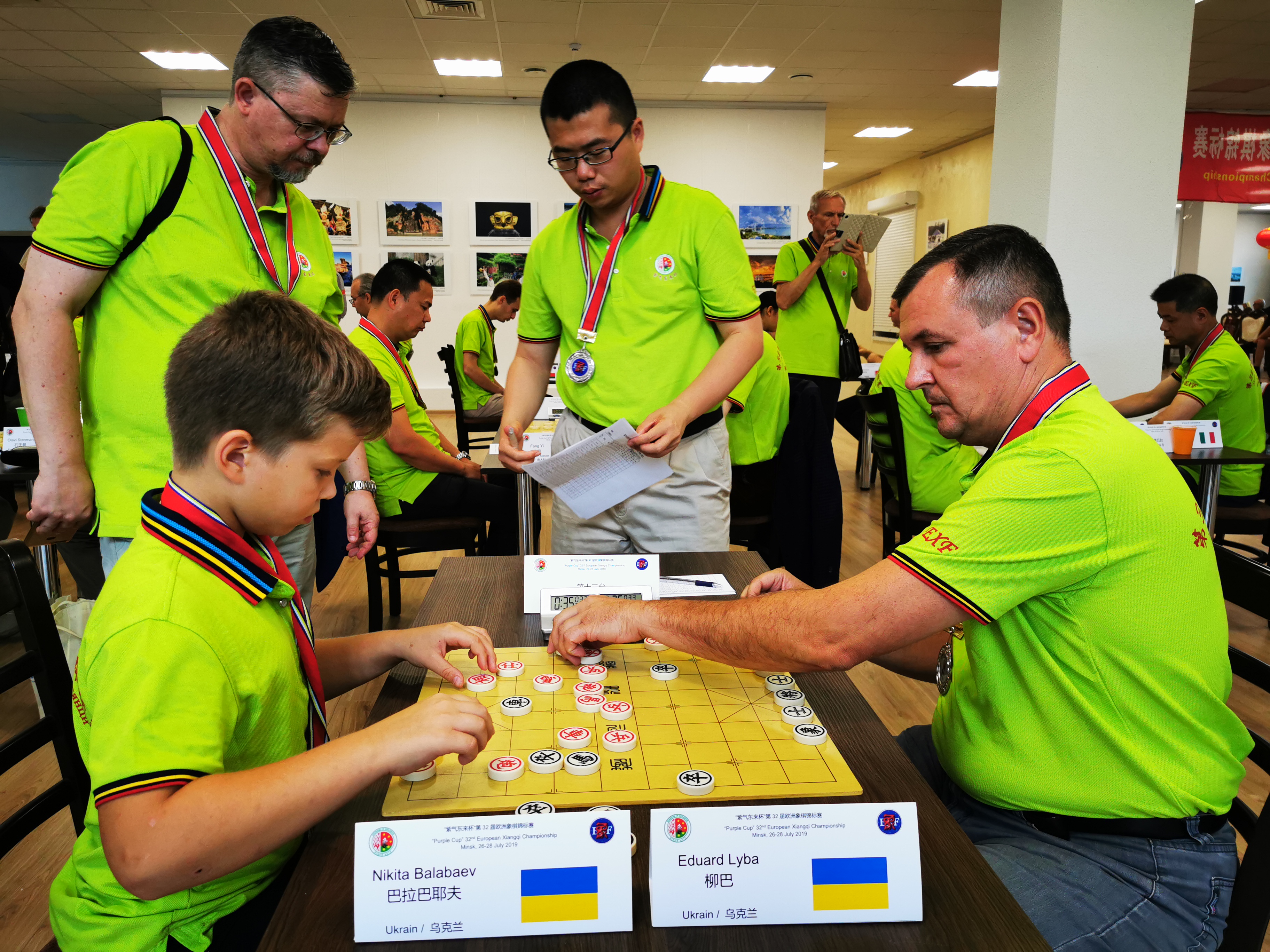
Diagram 2 Wang Ge the Arbiter
Xiangqi related titles
Mr. Wang Ge’s work with Xiangqi does not end here. He also serves as the Deputy Director of the Xiangqi Promotions Division of the European Xiangqi Federation.
He also represents the Chinese Xiangqi Association in promoting Xiangqi in Germany and is a professional coach rendering his services to DJK Schulschach, Stuttgart, where he served to teach and promote Xiangqi for over seven years. He acquired a working permit in Germany because of his services and was eventually awarded permanent residency in Germany in 2020 for recognition of his work.
Xiangqi Academic Achievements
From 2015 to 2020, Wang Ge has actively participated in the Annual Hangzhou Chess Conference, where his theses have been well received. He has submitted seven papers, and ALL of them managed to win prizes, stemming his name as one of the most important Xiangqi promoters in Europe.
Any participant can only submit two papers per year, but Wang managed to get these theses recognized seven times in six years! An awe-inspiring record indeed! He had written well over ten hundred thousand words for his articles.
The following is a list of his theses in Chinese.
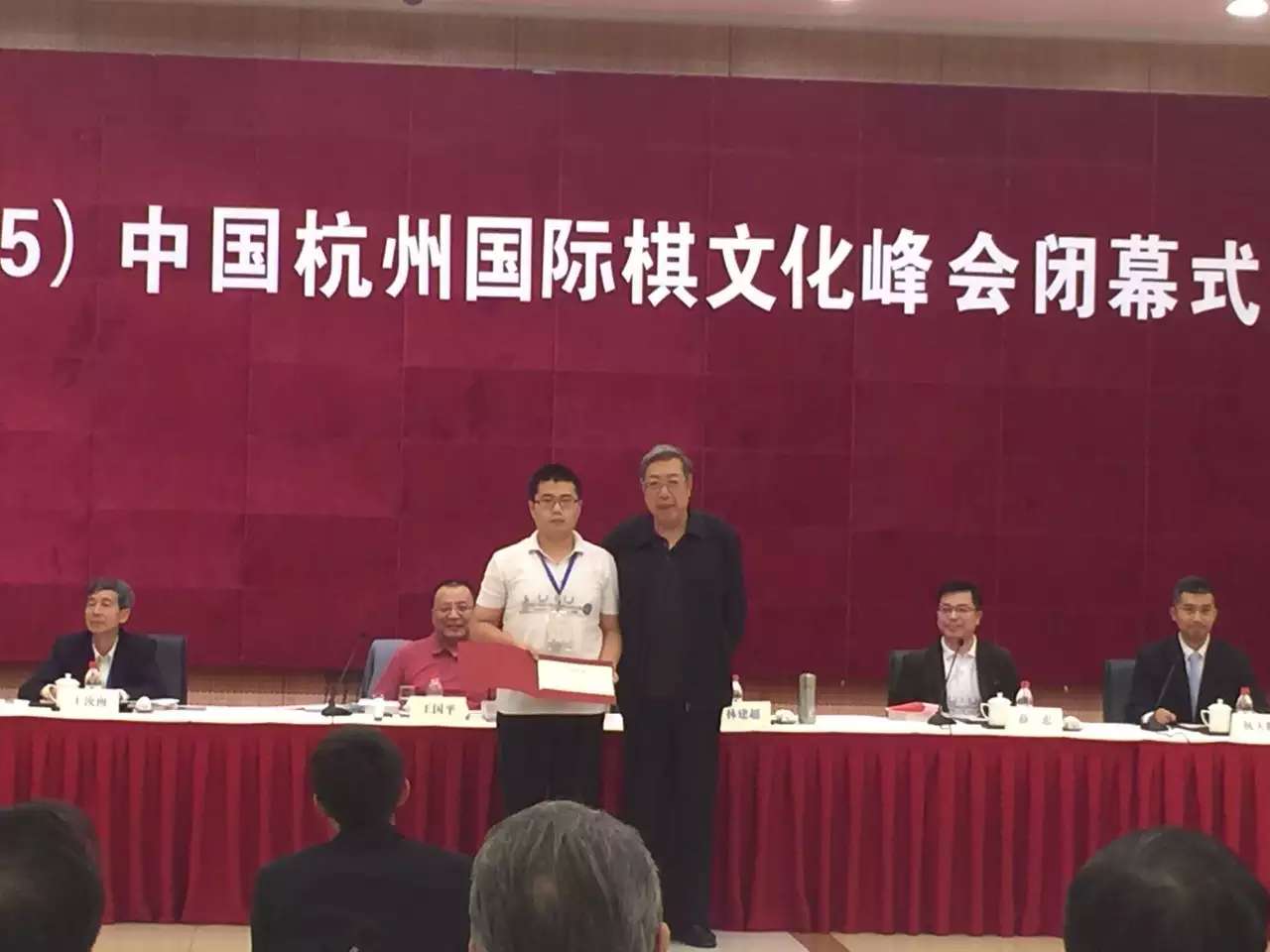
Diagram 3 Wang Ge receiving an award at the2015 Hangzhou Chess Conference
First Runner Up Thesis 二等奖论文
- 1、“棋务维新”——西学、东鉴、中用,三棋荟萃 德国斯图加特象棋推广浅见
Acknowledged Theses 优秀论文
- 2、棋务维新之二 续茶马古道,探茗棋新途 中国茶文化和棋文化在德国巴符州斯图加特市的联合推广
- 3、以终身习棋为导向 以学科设置为目标 将国际象棋列入德国学校必修课的努力 德国国际象棋协会及青少年联合会简介
- 4、斯图传“棋“ 浅论中国象棋海外推广的意义
Theses who made it into the final round of selection 入围论文
- 5、棋务维新 之三 一棋一国度,三棋共世界:通过斯图加特的三棋(国际象棋、日本将棋和中国象棋)推广实践,浅析棋类交叉教学的意义和实践方案
- 6、”东风西渐”——象棋海外学员水平等级考试的设立及其意义
- 7、浅析通过象棋术语翻译讲好中国故事
Wang Ge’s linguistic abilities did not restrict him from promoting Xiangqi in German. He was able to assist and coordinate a project to translate Xiangqi terms into French.
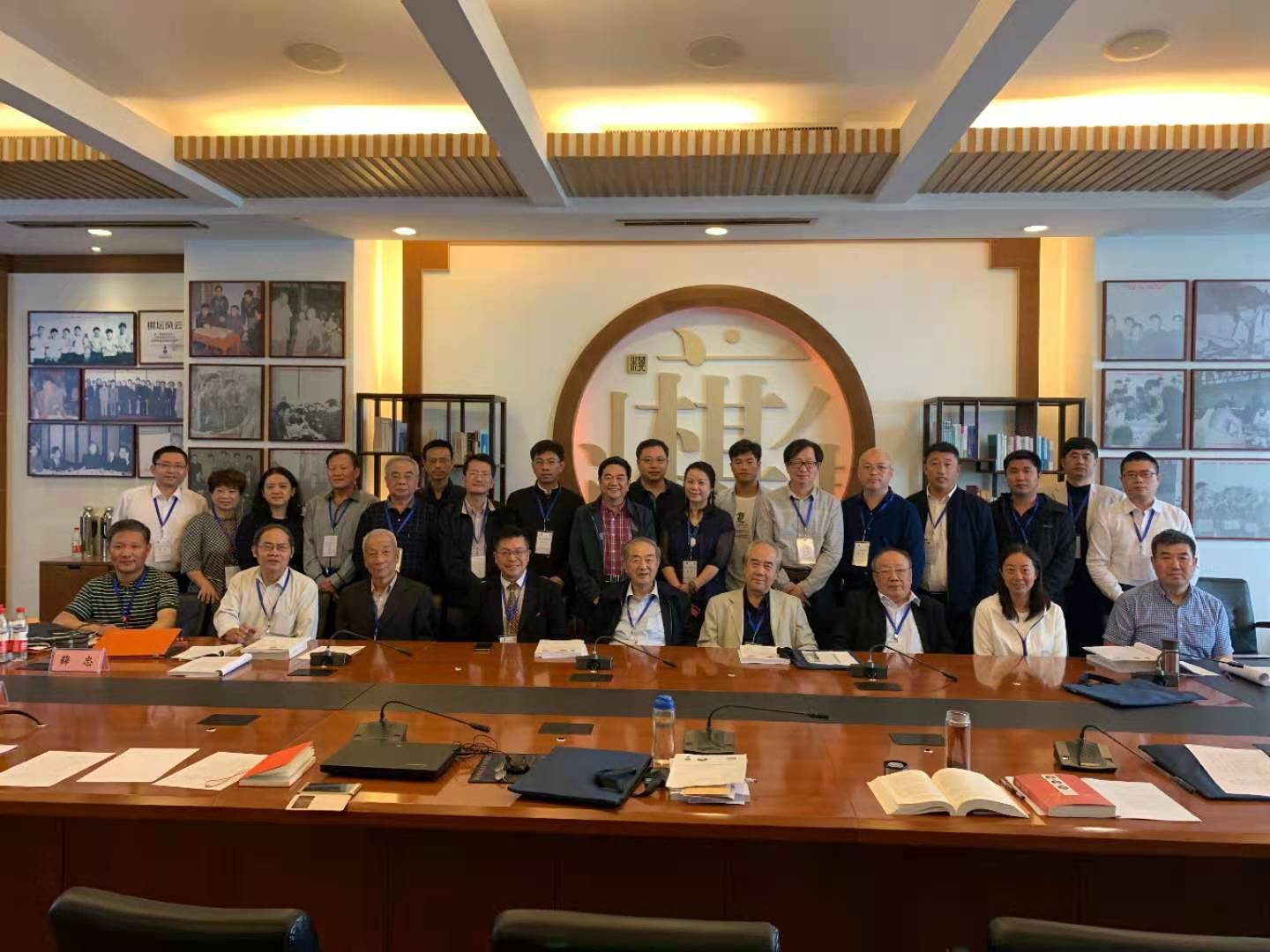
Diagram 4 Wang Ge on far right. In this picture are several Xiangqi Masters and important people.
Interview with Wang Ge
The following is a short interview with Wang Ge as the author tries to learn from his extensive experience in promoting Xiangqi to the West. The interview was held via correspondence and via Wechat, where the two communicate regularly on different Xiangqi matters and issues. The interview covers many topics on the promotion of Xiangqi, teaching the next generation, et cetera. His insights are quite refreshing and inspiring. The author believes that the reader will gain much from reading his insights and perhaps see Xiangqi from a different perspective.
Jim: Good day, my friend. First of all, I would like to thank you for doing this short interview with me. We have met and discussed so many things about Xiangqi over the years. But I have never asked you how did you become acquainted with Xiangqi?
Wang: When I was in elementary school, I had participated in a summer camp for computer science that was held by Tongji University (同济大学).
Jim: But were you serious with Xiangqi at that time?
Wang: No. It was after coming to Germany that I started devoting myself to Xiangqi.
Jim: I know you like different forms of chess. Other than Xiangqi, what do you play?
Wang Ge: I also like to play International Chess and Japanese Shogi.
Jim: You know I would love to visit different parts of the world and see how Xiangqi is faring. Can you tell me more about Stuttgart?
Wang: Well, Stuttgart is famous for its automobile industry. It was the place where the first-ever car was invented and is home to the headquarters of Mercedes-Benz and Porsche. Stuttgart is located in South-west Germany with surrounding forests and hills with vineyards. It is the 6th most populated city in Germany and accounts for 1/6 of the annual German GDP. It is also a city with a lot of cultures!
Jim: Of all the places in Germany, why did you decide to stay in Stuttgart?
Wang: It was a matter of convenience. I graduated from the University of Nürtingen-Geislingen in Stuttgart.
Jim: At the three annual Hangzhou Chess conferences that I was lucky to attend, I have heard you share your teaching experiences in Germany when promoting Xiangqi. I know you have tons of experience in that area. Can you share a little of your insights on teaching Xiangqi to children?
Wang: Children are the future of any society, race, or culture. They do not have any bias, and the mind of a young child is like plastic. On my part, I try my best to create opportunities for them to experience and enjoy the Chinese culture. While many of these children may not actively pursue Xiangqi when they grow up, I always try to record their initial encounters with Xiangqi. It is a valuable and unforgettable experience for both the kids and me.
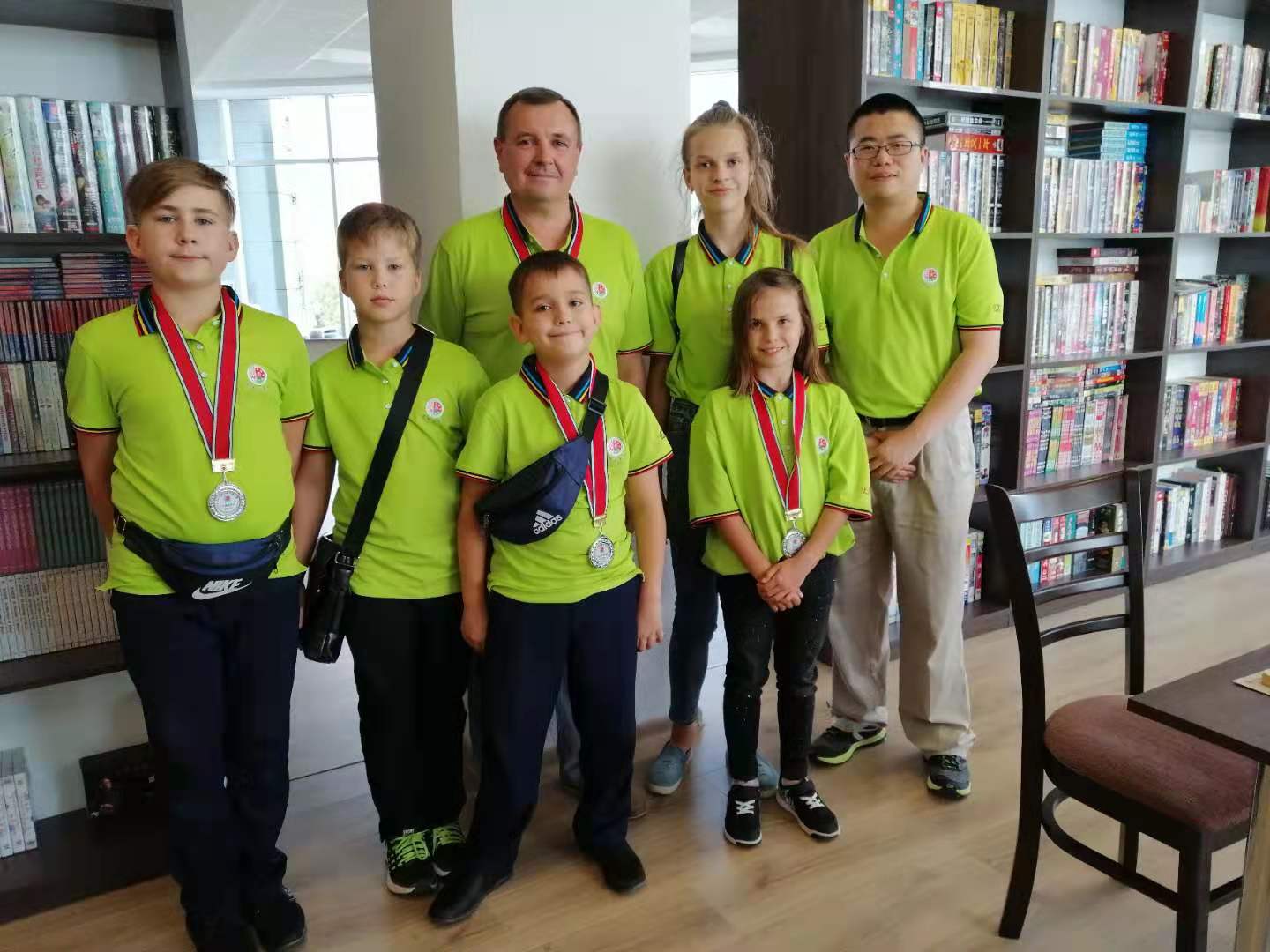
Diagram 5 Children are the future!
Jim: As a continuation of the topic, what do you think are the problems that non-Chinese children face when introduced to Xiangqi, especially in a non-Chinese environment?
Wang: I believe that the ‘atmosphere’ is not there. Simply put, the environment for pursuing a lifelong affair with Xiangqi is not present at the moment. It is not difficult to introduce a child to Xiangqi, but turning that hobby into a lifelong passion is extremely hard as the general environment is not conducive.
Jim: Over the years, I have communicated with many different people about Xiangqi promotion. It seems that one of the most significant issues is the availability of obtaining Xiangqi sets. Is that the case in Stuttgart or Germany, for that matter?
Wang: Things have changed. Xiangqi sets are now readily available through online purchases and should meet the needs of most Xiangqi enthusiasts.
There has also been an active movement to promote Xiangqi recently, and I believe it has been most helpful.
Jim: Continuing on the subject. Where do you conduct your classes, and what is the time needed?
Wang: I usually hold my classes in the activity room in schools. I spend about one to two hours per week for each class. Other times I visit International Chess Clubs or other venues like tea houses or hotels where space to share the game is readily available.
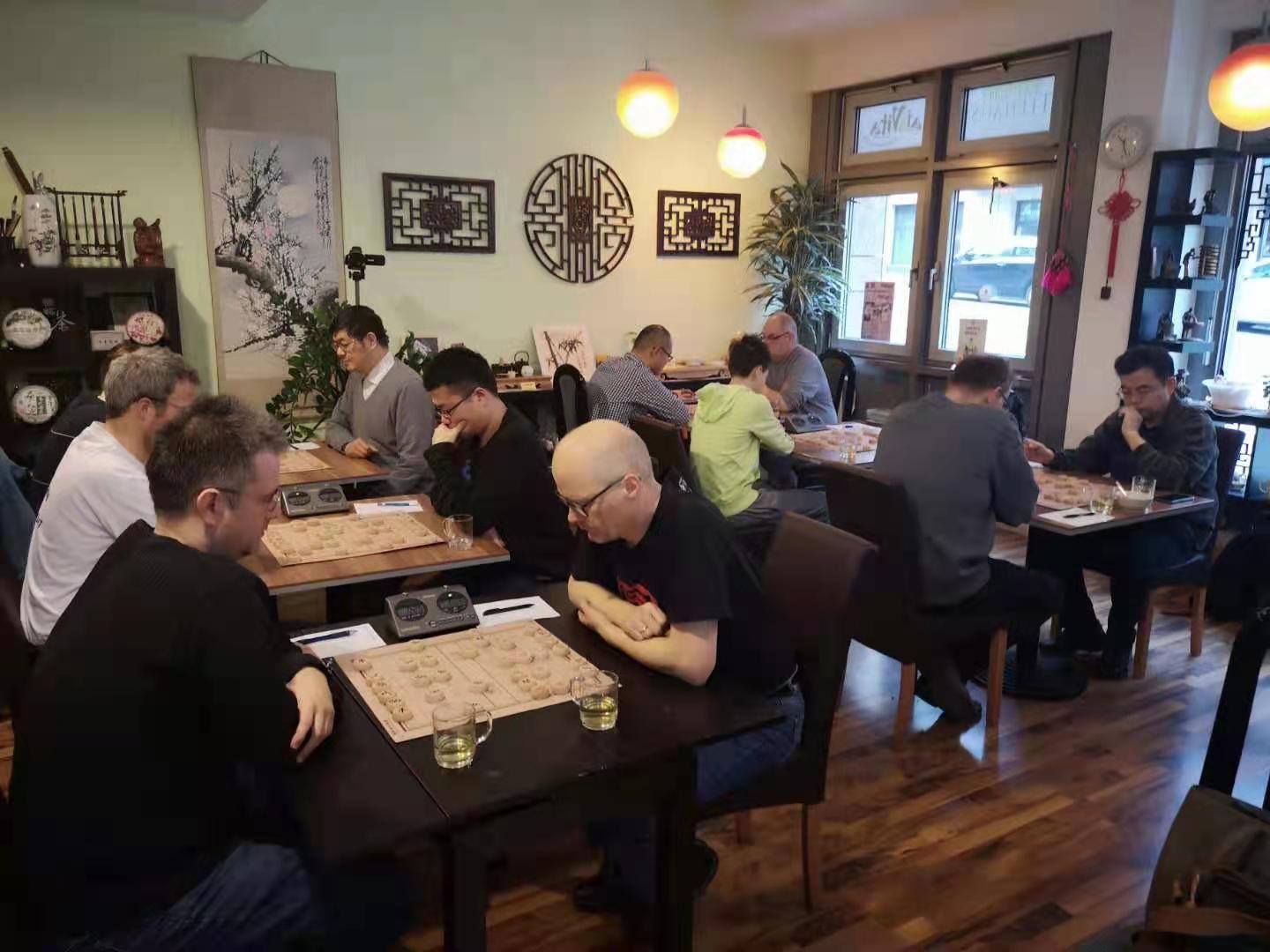
Diagram 6 Playing Xiangqi in Germany. IGM Xue Handi is in the background.
Jim: I am very interested as to whom do you promote Xiangqi as a target audience? Is it hard for them to understand the rules of Xiangqi? How much do they know?
Wang: I would prefer to spread Xiangqi to other people in my age group. It will make things even easier if they had some background in International Chess. But it is hard to find an audience who will meet these two criteria. It is not hard for them to learn the rules of Xiangqi. Even the World Xiangqi Rules can be explained without too much of a hassle.
Jim: Teaching Xiangqi can be challenging if you do not have a curriculum or other reading material. Is there readily available material on Xiangqi in German?
Wang: There is still a glaring lack of Xiangqi material in German. Luckily, the amount of English material on the subject is slowly growing. We need more books and material targeted at young people. It would be best if this material contains lots of diagrams to help their understanding. As for me, I do not think that ebooks are good for teaching Xiangqi.
Jim: Please tell me of any problems or obstacles that you have met in your efforts to spread Xiangqi. I would love to hear your insights.
Wang: I would like to discuss this issue from several different angles.
First of all, the people. I try to promote Xiangqi in places where there are lots of people. An ideal location would be schools or during festive seasons. Being able to promote Xiangqi in schools or during seasons where there are many people will significantly increase the efficiency of promotion. It does more good than teaching a small group of people at one time.
Secondly, I try to build a conducive atmosphere when I teach and promote the game. My students or audience get to play the game and enjoy it knowing that they are competing in a fair environment.
The third issue I have would be the materials needed to promote Xiangqi. As you mentioned, Xiangqi sets, teaching material, and a Xiangqi syllabus are all very lacking.
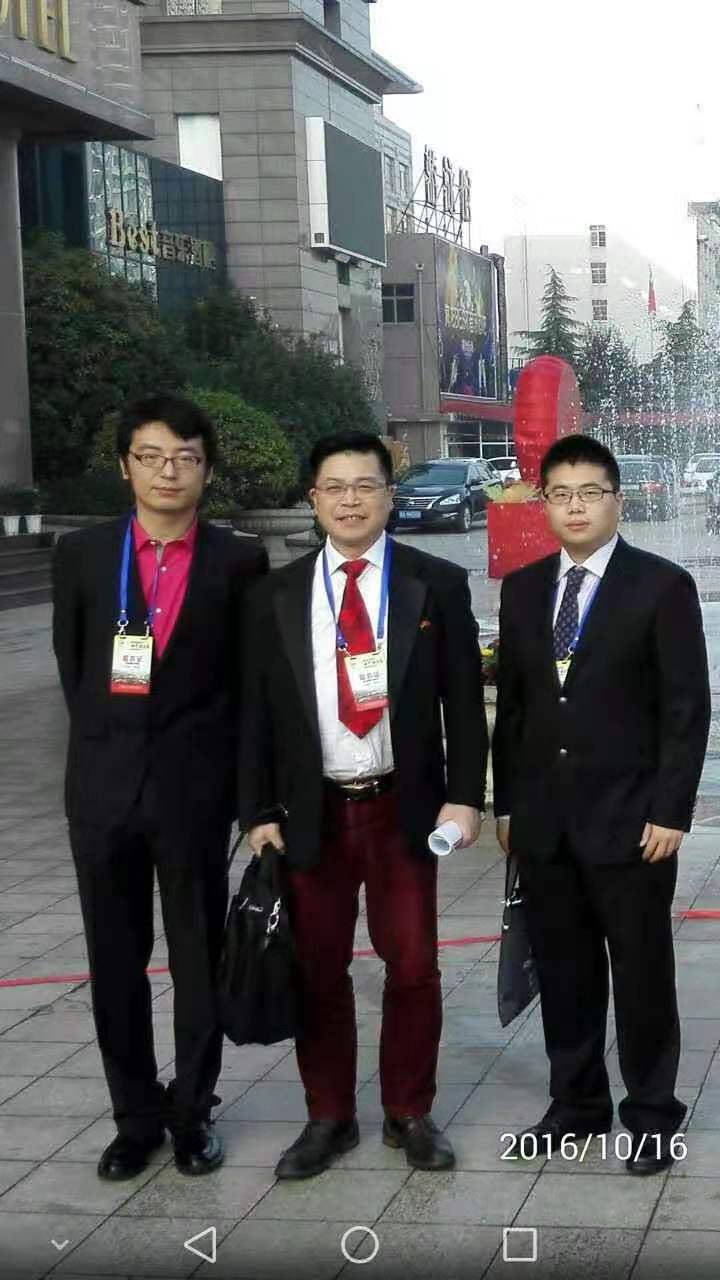
Diagram 7 Wang Ge with IGM Romeo Xue and IGM Pu Fangyao (far left). All three have are important promoters of Xiangqi.
The fourth issue that I would like to address is the Xiangqi-related activities. As a game for the masses, people need to take time off their schedules to play the game. The lack of time can be an issue at times. However, I try to give the perception that Xiangqi can be an exciting pastime to kindle their interest. Hopefully, my students or audience will be interested enough to participate in big events like international tournaments and international cultural events, et cetera, which feature Xiangqi.
As for teaching Xiangqi to the next generation, I am not satisfied with the style of teaching that is used currently. Because of various constraints, I can only use a ‘fast food’ method of teaching and need to focus on particular Xiangqi topics instead of introducing Xiangqi in its entirety. I would like to do more if given more time to introduce Xiangqi in a more wholesome manner.
Despite the lack of time spent with students, I have found several bright prospects for Xiangqi here and there. Unfortunately, they have not been able to transform into Xiangqi competitors.
Jim: You have been touching on the visibility of Xiangqi in the West as part of your efforts to promote the game. In your experience, what do you think can be done to raise the visibility of Xiangqi in Western countries?
Wang: I think the best way to raise awareness of Xiangqi is to make use of the international stage. Major cultural events, expositions, and cultural exchanges can help our cause a lot. It would be even better if there were media coverage. If we can arrange for lessons on an open stage or be able to make use of public or government resources to promote Xiangqi, it will raise the visibility and awareness of Xiangqi by several notches.
Jim: I have often been asked by different people sending me emails on how to improve their game. What are your thoughts? How do you teach your students to improve their games?
Wang: The Master leads the Disciple into the realm, but it will be the Disciple who has to put in the hard work to succeed. As with any discipline, the disciple much put much effort into the fundamentals to ensure a solid and sturdy base.
That is why I place a lot of emphasis on teaching Xiangqi in schools. If Xiangqi is grounded in schools, Xiangqi activity can be fulfilling and self-generating.
Strong International Chess players will find crossing the gap to Xiangqi easier. I believe experienced International Chess players can play a few games with artificial intelligence, using apps or other programs, and be able to learn the basics of Xiangqi on their own. I have seen many such examples. I fervently hope that there are Xiangqi activities like the recent Xiangqi Tag Team Matches that could inspire these self-learned Xiangqi players further. Xiangqi Tag Team Matches are excellent in helping such a group of Chess players as their more experienced teammates can often share pointers with them and give them further direction in their quest to learn Xiangqi. The players whom I have seen participating in Xiangqi Tag Team matches seem to have benefitted a lot as they go back home and continuing playing Xiangqi. This appears to be a novel way of improving your game!
(Note: The author has written an article introducing Xiangqi Tag Team Matches. Please click on the link.)
Jim: Interesting idea! What you said seems to have helped the promotion of Xiangqi too. Continuing on this topic, what do you think are the essential things required to promote Xiangqi to an international audience?
Wang: I believe in the mantra of “Think Global and Act Local.” To spread Xiangqi efficiently, we need to introduce and promote the game using the local language or dialects. Xiangqi must also have meshed together with local customs so that it does not seem foreign.

Diagram 8 Think Global and Act Local
Jim: Have you encountered any exciting things or problems when promoting Xiangqi?
Wang: LOL, I have indeed, and I have written them down in the theses that I have submitted to Hangzhou. I believe that you have read them and they are too much for our short interview.
Jim: Yes indeed! Fascinating stuff but too long for our interview. Back to our topic of promoting Xiangqi. You have taught so many students over the years. What hopes do you have for them?
Wang: In the long run, I hope to maintain their love for Xiangqi when they grow up to become adults. I hope that they will be able to give back and help promote the game then. When they become parents themselves, I wish that they will allow their children to learn Xiangqi too.
Meanwhile, looking into the near future, I wish that more international students here in Germany will join me in my quest.
Over the years, it has been easier to receive support from China in the form of teaching materials like demonstration boards, playing sets, and so on. These will help them in their quest and make things easier for enthusiasts like us.
Jim: Any visions for the future?
Wang: I have mentioned it above. But I also would hope that Xiangqi can be included in the curriculum for International Chess to gain exposure and become a topic that more people can be interested very quickly. One day, I hope that Xiangqi will become a necessary ‘export’ from China and be one of the keys to help the West unlock and understand the Chinese culture. Without a doubt, Xiangqi is one of the best ways to understand Chinese culture. It will also offer unique perspectives!
Jim: As a Xiangqi promoter whose primary medium is the internet, I have found it hard to promote Xiangqi using social media, websites, Youtube videos, et cetera. And I do not have to deal with issues of culture or geography as much as you do. Tell me, what issues of culture or geographical restrictions have hindered your quest?
Wang: It has been a long ride. But we can and must persevere. As the saying goes, dripping water will slowly erode stone. We need to be more proactive and take the initiative when promoting Xiangqi. After all, I firmly believe that there are always more chances than hardships!
Jim: I have never been to Germany. I am interested in the Xiangqi tournaments there. Can you shed a little light?
Wang: Germany is proud to say that she has held all the major events in Xiangqi. There is a national Xiangqi tournament whereby players are rated and ranked. However, most of the top players are still either of Chinese or Vietnamese origin, and there is still a gap to bridge in terms of skill level between Chinese/Vietnamese players and their European counterparts. Perhaps a ranking system for non-Chinese and non-Vietnamese players could be a good idea to promote Xiangqi.
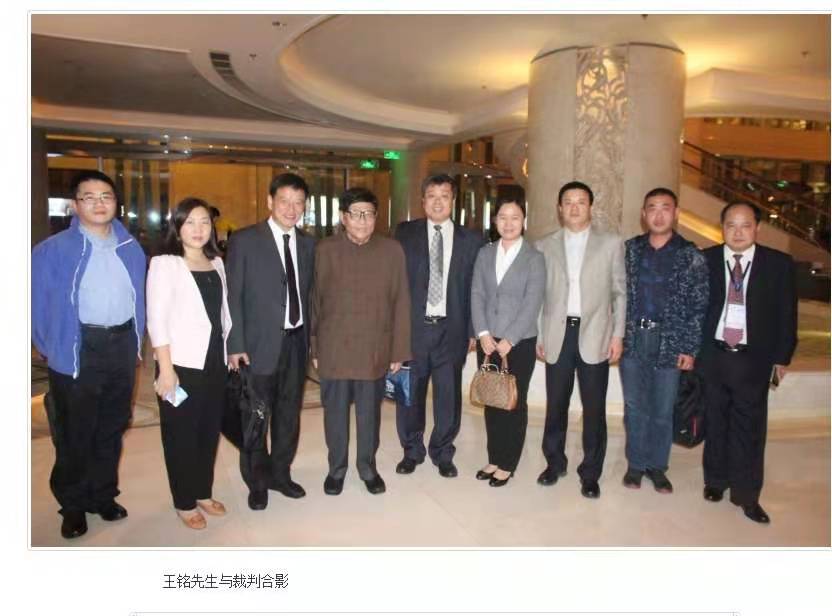
Diagram 9 Wang Ge (far left) with important Xiangqi arbiters from China
Jim: I have always been interested in the views of other people on a few subjects. And although we have discussed this before, I would like to hear your take on using figurines for Xiangqi pieces and the rules for tournaments.
Wang: Regarding using figurines for Xiangqi, I try to look at this issue from two different viewpoints. If Xiangqi were to be an ambassador for the Chinese culture, I feel that using figurine pieces would be simply a waste of time. However, it does seem to have a role to play in helping to promote the game to non-Chinese. It can also be used as a supplement to help newcomers be accustomed to Xiangqi and bridge the gap from International Chess to Xiangqi. Perhaps it is worth a try.
As for the Rules of Xiangqi, I personally feel that the current World Xiangqi Rules is still insufficiently ‘internationalized.’ I do not even mind saying that the Rules of Xiangqi can take a page or two out of the rules used in International Chess. There should not be more than seven simple rules, even for tournaments. There is no universal game that requires forty examples to explain just one law in Xiangqi. What needs to be trimmed should be trimmed.
For example, the rules for Mahjong were terribly complicated in the past, but still, a few crucial rules could be identified and used for the general promotion of the game. Even abstract concepts can be done in this manner. I believe it to be the case for Xiangqi, and I think that simplifying the current rules is just a matter of time. Perhaps the Rules for Jie Qi and Fan Fan Qi will also be simplified at this time.
(Note: Jie Qi and Fan Fan Qi are both prevalent variants of Xiangqi that can be found on the biggest Xiangqi app in the world, Tian Tian Xiangqi.)
Jim: Interesting take on the situation. While we are on the topic of Chinese culture, do you think that it is a plus for promoting Xiangqi or that it might be a deterrent?
Wang: Any Xiangqi promotion without promoting the values of the Chinese culture will fail miserably. International Chess is the second biggest sport in the world today because it has its roots in culture. It is also ubiquitous. There are traces of International Chess in Harry Potter, Legoland, Star Wars, Louis Vuitton, Formula One racing, et cetera. These traces take the form of checkered squares, which are associated with the International Chessboard.
On the same note, the Chinese characters (or ideograms) do have their international charm. For example, it is not hard to discuss elephants and bring in Xiangqi. Zoos, where elephants live, are perhaps some of the best, underappreciated places where Xiangqi can be spread. After all, it is the Elephant Game, just as the Castle and Knight are to International Chess.
Jim: Another fascinating perspective! I would want to ask, based on your personal experience, any time frames that we should look out for during the promotion of Xiangqi? Something that might give us a sense of direction or gauge the work that we have done?
Wang: In the recent five years, I have seen Xiangqi activity exploding at a pace never seen before. If this growth persists, the next most crucial step would be to train more coaches to meet the needs of the growing number of Xiangqi players.
Hopefully, after a decade of work, Xiangqi can be preserved in the curriculum of schools. I have been hard at work trying to realize this ambition, but unfortunately, Covid 19 seems to have halted most of the work. Nevertheless, it remains a goal of mine.
Jim: I have another interesting question for you. I know you are based in Germany most of the time. So, how do you keep up with Xiangqi activity in China and other parts of the world?
Wang: I can only catch up based on the news that I read over the internet.
Jim: In your resume and credentials, International Chess and Japanese Shogi are among the forms of chess that you teach. It is also apparent that you are promoting them too. How do you compare Xiangqi to these other forms of chess?
Wang: From my personal experience, I believe that the population of Xiangqi players is catching up quickly with the population of Shogi and Weiqi players. It will not be surprising if the number of Xiangqi players surpasses these two groups in the near future.
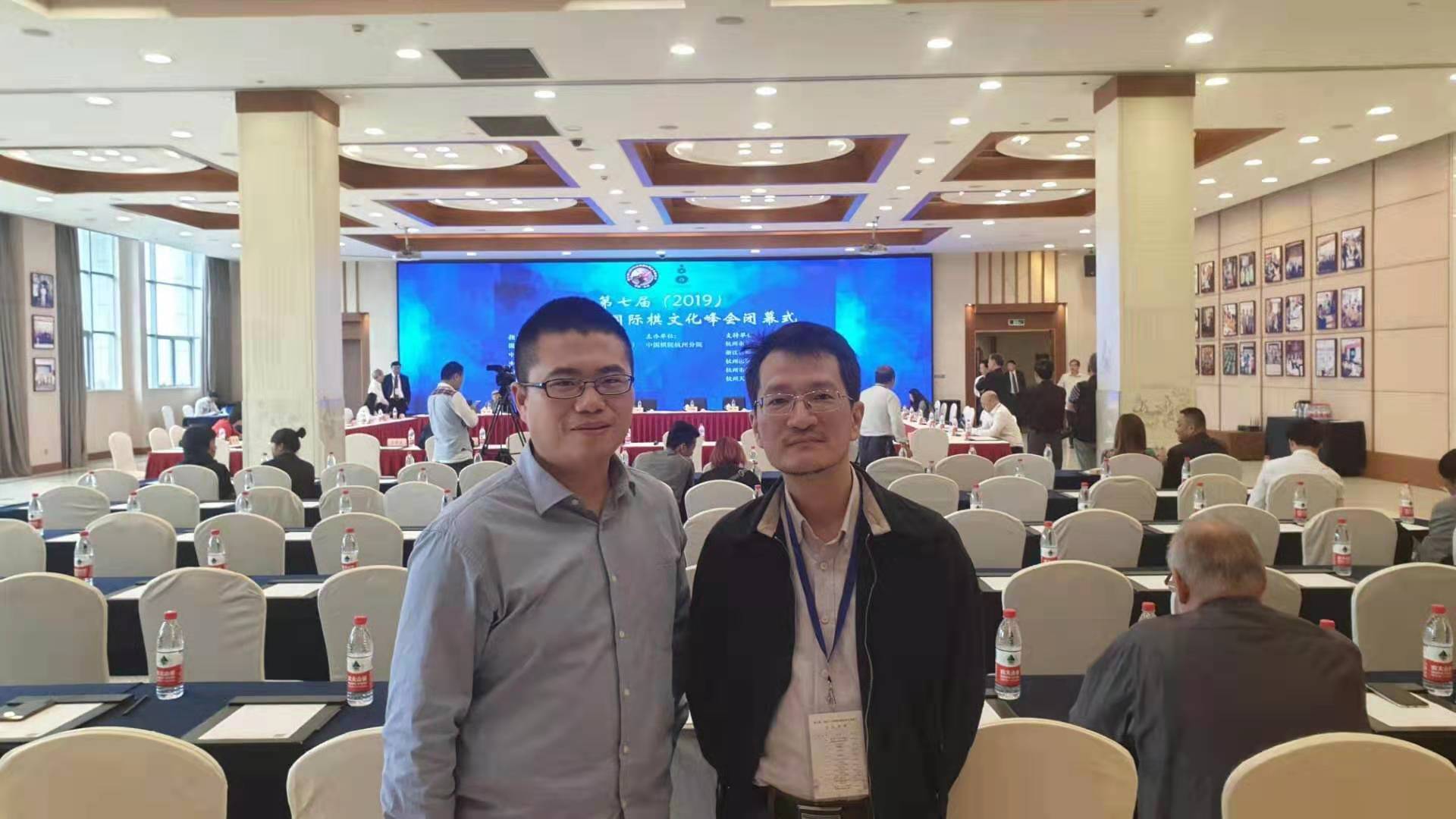
Diagram 10 Wang Ge with Xiangqi activist Yang Bowei (co-author of the first Xiangqi Dictionary)
Jim: We have talked so much about teaching Xiangqi to the next generation. Can you give me a summary of your experiences?
Wang: Xiangqi is perhaps another stage where International Chess players can shine. Any International Chess player with a strong background can pick up Xiangqi very quickly.
Xiangqi is also not as daunting as it may seem and is very easy to pick up and learn. Identifying the Chinese characters or ideograms is not as difficult as it may seem, even if Simplified Chinese or Traditional Chinese characters are involved. Spend a little bit of time to identify the critical brushstrokes of each character, and it is easily identifiable.
Xiangqi also represents a window into another world that might have been curious for Europeans or Westerners. But it is an exciting world that is worth every minute exploring. Immersing in the culture of the Chinese will only allow the world to understand China better.
It is my goal that Xiangqi becomes well known and perhaps even ubiquitous. I hope that more and more people will be aware of its existence and more people will eventually enjoy it. Perhaps, Xiangqi is another career for International Chess coaches and players alike.
Since 2014, I have finished the first part of my five-year plan to promote Xiangqi. I have managed to see at least one hundred more new Xiangqi players play the game each year. At this point, I have introduced Xiangqi to over one thousand people. One of my proudest achievements is that I have trained ten non-Chinese people to become Xiangqi coaches. These coaches will be crucial as they will fill the void when Xiangqi becomes more and more popular.
Jim: What will you focus on when promoting Xiangqi in the near future?
Wang: I hope to teach and promote Xiangqi, International Chess, and Shogi to the German public. Hopefully, I can reach out to more people and share with them, in German, the intricacies of playing chess. I hope to organize more introductory courses to let the general public enjoy and fall in love with playing different forms of Chess. Hopefully, one day they will form the habit of playing Chess.
Jim: Thank you again for willing to share your insights with fellow Xiangqi enthusiasts and promoters like me! All the best of luck in your future endeavors.
Afterthoughts
Promoting Xiangqi is a hard job as the author has experienced himself for the past ten years. That is why he has the utmost respect for fellow Xiangqi enthusiasts like Wang Ge, who have devoted their lives to Xiangqi. While there is still much to do, we can all be optimistic about the world getting to know Xiangqi!
